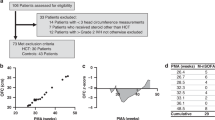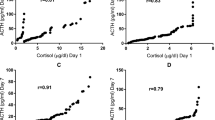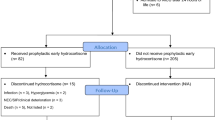Abstract
Objective:
Both excess and insufficient levels of glucocorticoid in extremely low birth weight (ELBW) infants have been associated with adverse hospital outcomes, whereas excess glucocorticoid exposure has been associated with long-term adverse neurodevelopment. Our objective was to evaluate the relationship between neonatal cortisol concentrations and long-term outcomes of growth and neurodevelopment.
Study Design:
As part of a multicenter randomized trial of hydrocortisone treatment for prophylaxis of relative adrenal insufficiency, cortisol concentrations were obtained at 12 to 48 h of postnatal age and at days 5 to 7 on 350 intubated ELBW infants, of whom 252 survived and returned for neurodevelopmental follow-up at 18 to 22 months corrected age. Cortisol values from each time point were divided into quartiles. Growth and neurodevelopmental outcome were compared for each quartile.
Result:
Median cortisol value was 16.0 μg per 100 ml at baseline for all infants, and 13.1 μg per 100 ml on days 5 to 7 in the placebo group. Outcomes did not differ in each quartile between treatment and placebo groups. Low cortisol values at baseline or at days 5 to 7 were not associated with impaired growth or neurodevelopment at 18 to 22 months corrected age. High cortisol values were associated with an increase in cerebral palsy, related to the increased incidence of severe intraventricular hemorrhage (IVH) and periventricular leukomalacia.
Conclusion:
Low cortisol concentrations were not predictive of adverse long-term outcomes. High cortisol concentrations, although predictive of short-term adverse outcomes such as IVH and periventricular leukomalacia, did not additionally predict adverse outcome. Further analysis into identifying factors that modulate cortisol concentrations shortly after birth could improve our ability to identify those infants who are most likely to benefit from treatment with hydrocortisone.
This is a preview of subscription content, access via your institution
Access options
Subscribe to this journal
Receive 12 print issues and online access
$259.00 per year
only $21.58 per issue
Buy this article
- Purchase on Springer Link
- Instant access to full article PDF
Prices may be subject to local taxes which are calculated during checkout
Similar content being viewed by others
References
Mammel MC, Green TP, Johnson DE, Thompson TR . Controlled trial of dexamethasone therapy in infants with bronchopulmonary dysplasia. Lancet 1983; 1: 1356–1358.
Yeh TF, Torre JA, Rastogi A, Anyebuno MA, Pildes RS . Early postnatal dexamethasone therapy in premature infants with severe respiratory distress syndrome: a double-blind, controlled study. J Pediatr 1990; 117 (2 Pt 1): 273–282.
Shinwell ES, Karplus M, Reich D, Weintraub Z, Blazer S, Bader D et al. Early postnatal dexamethasone treatment and increased incidence of cerebral palsy. Arch Dis Child Fetal Neonatal Ed 2000; 83: F177–F181.
Yeh TF, Lin YJ, Lin HC, Huang CC, Hsieh WS, Lin CH et al. Outcomes at school age after postnatal dexamethasone therapy for lung disease of prematurity. N Engl J Med 2004; 350: 1304–1313.
Watterberg KL, Gerdes JS, Gifford KL, Lin HM . Prophylaxis against early adrenal insufficiency to prevent chronic lung disease in premature infants. Pediatrics 1999; 104: 1258–1263.
Huysman MW, Hokken-Koelega AC, De Ridder MA, Sauer PJ . Adrenal function in sick very preterm infants. Pediatr Res 2000; 48: 629–633.
Watterberg KL . Adrenal insufficiency and cardiac dysfunction in the preterm infant. Pediatr Res 2002; 51: 422–424.
Watterberg KL, Scott SM . Evidence of early adrenal insufficiency in babies who develop bronchopulmonary dysplasia. Pediatrics 1995; 95: 120–125.
Watterberg KL, Scott SM, Backstrom C, Gifford KL, Cook KL . Links between early adrenal function and respiratory outcome in preterm infants: airway inflammation and patent ductus arteriosus. Pediatrics 2000; 105: 320–324.
Scott SM, Cimino DF . Evidence for developmental hypopituitarism in ill preterm infants. J Perinatol 2004; 24: 429–434.
Watterberg KL, Gerdes JS, Cole CH, Aucott SW, Thilo EH, Mammel MC et al. Prophylaxis of early adrenal insufficiency to prevent bronchopulmonary dysplasia: a multicenter trial. Pediatrics 2004; 114: 1649–1657.
Peltoniemi O, Kari MA, Heinonen K, Saarela T, Nikolajev K, Andersson S et al. Pretreatment cortisol values may predict responses to hydrocortisone administration for the prevention of bronchopulmonary dysplasia in high-risk infants. J Pediatr 2005; 146: 632–637.
Bonsante F, Latorre G, Iacobelli S, Forziati V, Laforgia N, Esposito L et al. Early low-dose hydrocortisone in very preterm infants: a randomized, placebo-controlled trial. Neonatology 2007; 91: 217–221.
Aucott SW, Watterberg KL, Shaffer ML, Donohue PK . Do cortisol concentrations predict short-term outcomes in extremely low birth weight infants? Pediatrics 2008; 122: 775–781.
Watterberg KL, Shaffer ML, Mishefske MJ, Leach CL, Mammel MC, Couser RJ et al. Growth and neurodevelopmental outcomes after early low-dose hydrocortisone treatment in extremely low birth weight infants. Pediatrics 2007; 120: 40–48.
Ng PC, Lee CH, Lam CW, Ma KC, Chan IH, Wong E et al. Early pituitary-adrenal response and respiratory outcomes in preterm infants. Arch Dis Child Fetal Neonatal Ed 2004; 89: F127–F130.
Fernandez EF, Montman R, Watterberg KL . ACTH and cortisol response to critical illness in term and late preterm newborns. J Perinatol 2008; 28: 797–802.
Ng PC, Lee CH, Lam CW, Ma KC, Fok TF, Chan IH et al. Transient adrenocortical insufficiency of prematurity and systemic hypotension in very low birthweight infants. Arch Dis Child Fetal Neonatal Ed 2004; 89: F119–F126.
Committee on Fetus and Newborn. Postnatal corticosteroids to treat or prevent chronic lung disease in preterm infants. Pediatrics 2002; 109: 330–338.
Finer NN, Powers RJ, Ou CH, Durand D, Wirtschafter D, Gould JB . Prospective evaluation of postnatal steroid administration: a 1-year experience from the California Perinatal Quality Care Collaborative. Pediatrics 2006; 117: 704–713.
Peltoniemi OM, Lano A, Puosi R, Yliherva A, Bonsante F, Kari MA et al. Trial of early neonatal hydrocortisone: two-year follow-up. Neonatology 2009; 95: 240–247.
Lodygensky GA, Rademaker K, Zimine S, Gex-Fabry M, Lieftink AF, Lazeyras F et al. Structural and functional brain development after hydrocortisone treatment for neonatal chronic lung disease. Pediatrics 2005; 116: 1–7.
Rademaker KJ, Uiterwaal CS, Groenendaal F, Venema MM, van Bel F, Beek FJ et al. Neonatal hydrocortisone treatment: neurodevelopmental outcome and MRI at school age in preterm-born children. J Pediatr 2007; 150: 351–357.
Sloviter RS, Sollas AL, Neubort S . Hippocampal dentate granule cell degeneration after adrenalectomy in the rat is not reversed by dexamethasone. Brain Res 1995; 682: 227–230.
Bolt RJ, van Weissenbruch MM, Popp-Snijders C, Sweep CG, Lafeber HN, Delemarre-van de Waal HA . Fetal growth and the function of the adrenal cortex in preterm infants. J Clin Endocrinol Metab 2002; 87: 1194–1199.
al Saedi S, Dean H, Dent W, Cronin C . Reference ranges for serum cortisol and 17-hydroxyprogesterone levels in preterm infants. J Pediatr 1995; 126: 985–987.
Soliman AT, Taman KH, Rizk MM, Nasr IS, Alrimawy H, Hamido MS . Circulating adrenocorticotropic hormone (ACTH) and cortisol concentrations in normal, appropriate-for-gestational-age newborns versus those with sepsis and respiratory distress: cortisol response to low-dose and standard-dose ACTH tests. Metabolism 2004; 53: 209–214.
Anand KJ, Barton BA, McIntosh N, Lagercrantz H, Pelausa E, Young TE et al. Analgesia and sedation in preterm neonates who require ventilatory support: results from the NOPAIN trial. Neonatal Outcome and Prolonged Analgesia in Neonates. Arch Pediatr Adolesc Med 1999; 153: 331–338.
Neu M, Goldstein M, Gao D, Laudenslager ML . Salivary cortisol in preterm infants: validation of a simple method for collecting saliva for cortisol determination. Early Hum Dev 2007; 83: 47–54.
Author information
Authors and Affiliations
Consortia
Corresponding author
Ethics declarations
Competing interests
The authors declare no conflict of interest.
Appendix
Appendix
The Prophet Study Group Principal Investigators and sites: Kristi L Watterberg, University of New Mexico; Jeffrey S Gerdes, University of Pennsylvania; Cynthia H Cole, Tufts University; Susan W Aucott, Johns Hopkins University; Elizabeth H Thilo, University of Colorado; Mark C Mammel, and Robert J Couser, Children's Hospital and Clinics of Minnesota, University of Minnesota; Jeffery S Garland, Wheaton Franciscan Health Care-St Joseph's, Medical College of Wisconsin; Henry J Rozycki, Virginia Commonwealth University; Corinne L Leach, State University of New York, Buffalo; Conra Backstrom, University of New Mexico; and Michele L Shaffer, Pennsylvania State University.
Rights and permissions
About this article
Cite this article
Aucott, S., Watterberg, K., Shaffer, M. et al. Early cortisol values and long-term outcomes in extremely low birth weight infants. J Perinatol 30, 484–488 (2010). https://doi.org/10.1038/jp.2009.191
Received:
Accepted:
Published:
Issue Date:
DOI: https://doi.org/10.1038/jp.2009.191
Keywords
This article is cited by
-
Assessment of adrenal function at birth using adrenal glucocorticoid precursor to product ratios to predict short-term neonatal outcomes
Pediatric Research (2020)
-
Association between plasma cortisol and death or vasopressor refractory hypotension in preterm neonates: a prospective, cohort study
Journal of Perinatology (2018)
-
The challenge of defining relative adrenal insufficiency
Journal of Perinatology (2012)
-
Stress and severity of illness in very low birth weight infants: what are we measuring?
Journal of Perinatology (2010)



